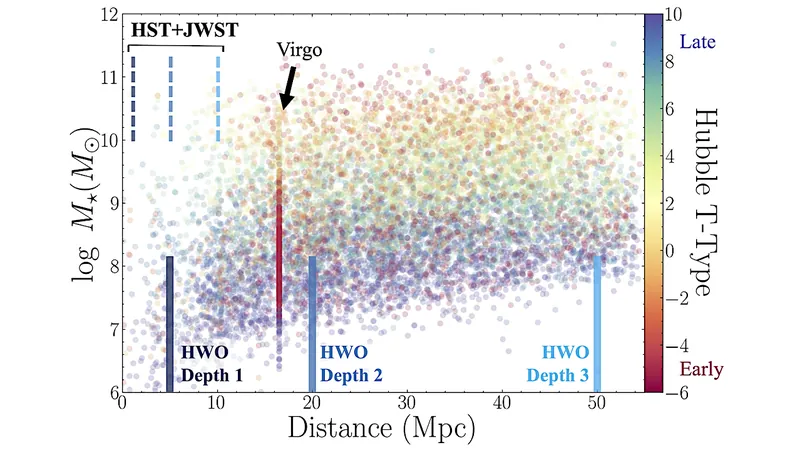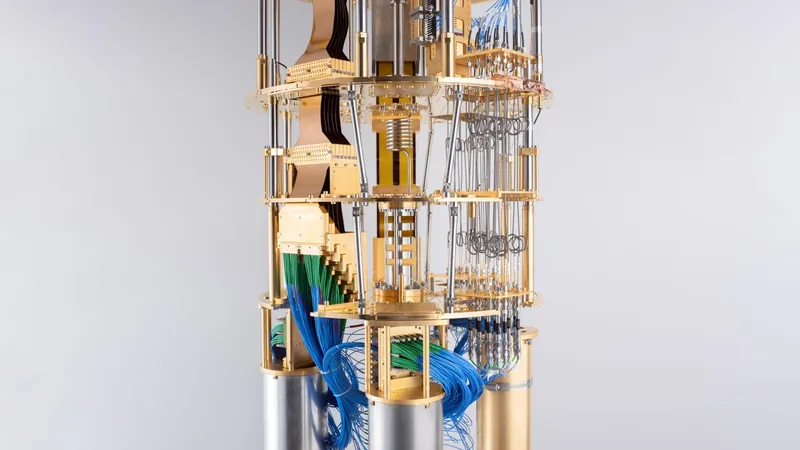
Electrons Dance on Quantum Fluids: The Future of Quantum Computing?
2025-05-19
Author: John Tan
Revolutionizing Quantum Computing with Innovative Qubits
Imagine a world where quantum computers can solve complex problems in the blink of an eye! This dream hinges on one crucial element: high-performing quantum bits, or qubits. Scientists globally are on a quest to discover the ultimate qubit, experimenting with a variety of materials and technologies.
A Game-Changing Approach to Qubits
A groundbreaking study from the FAMU-FSU College of Engineering offers a tantalizing glimpse into the future, where trapped electrons above ultraclean quantum fluids and solids—like liquid helium and solid neon—could redefine qubit performance. This approach promises a unique combination of exceptional control and pristine, defect-free environments, setting the stage for scalable qubits that could address major challenges faced by current technology.
"This platform blends the best of both worlds," says Wei Guo, a leading researcher on the study. With electrons residing in a high vacuum above superior material surfaces, and the ability to manipulate them using chip-based microwave technologies, we might be on the brink of a quantum revolution.
The Quest for Qubit Perfection
To maximize qubit efficiency, researchers focus on critical parameters such as coherence time—the lifespan of a qubit's quantum state—gate fidelity, and scalability. While pioneering platforms like superconducting and trapped-ion qubits show promise, they also come with significant limitations. Superconducting qubits suffer from material defects affecting their fidelity, while trapped ions are hindered by complex scaling requirements.
A Hybrid Solution for High-Fidelity Qubits
The review unveils an exciting alternative: electrons confined above the surfaces of quantum fluids or solids. These exquisite materials, only existing at ultra-low temperatures, allow for precise control via on-chip microwave circuits. This setup provides the vacuum-like advantages of trapped ions and the manipulation capabilities of superconducting qubits, creating a pathway towards high-fidelity qubits without the current compromises.
Pioneering Research and Future Implications
The article taps into a growing body of research, including remarkable strides made by Guo and his team, who in 2022 made headlines by demonstrating quantum operations using electrons on solid neon. Recently, they've also showcased how electrons can bind spontaneously to surface features on solid neon, creating new quantum states that influence qubit dynamics.
Additionally, the review encompasses advancements in electron-on-helium qubits and other innovative platforms from researchers worldwide, providing a comprehensive and accessible resource for scientists eager to explore this niche yet promising field of quantum device development.
Bridging Knowledge Gaps in Quantum Science
According to Guo, the understanding of materials like superfluid helium and solid neon is crucial for the broader quantum information science community. "If there are no functional qubits, then all algorithms are in vain. The quantum fluids and solids field is small, yet vital inquiries into these materials can open up significant avenues for research. As more engineers and scientists familiarize themselves with these exciting materials, we can better unlock the full potential of quantum computing."
The insights shared in the review emerged from a FSU Quantum Initiative workshop, illustrating the growing collaboration in this pivotal area of research, promising a brighter future for quantum technology.





 Brasil (PT)
Brasil (PT)
 Canada (EN)
Canada (EN)
 Chile (ES)
Chile (ES)
 Česko (CS)
Česko (CS)
 대한민국 (KO)
대한민국 (KO)
 España (ES)
España (ES)
 France (FR)
France (FR)
 Hong Kong (EN)
Hong Kong (EN)
 Italia (IT)
Italia (IT)
 日本 (JA)
日本 (JA)
 Magyarország (HU)
Magyarország (HU)
 Norge (NO)
Norge (NO)
 Polska (PL)
Polska (PL)
 Schweiz (DE)
Schweiz (DE)
 Singapore (EN)
Singapore (EN)
 Sverige (SV)
Sverige (SV)
 Suomi (FI)
Suomi (FI)
 Türkiye (TR)
Türkiye (TR)
 الإمارات العربية المتحدة (AR)
الإمارات العربية المتحدة (AR)